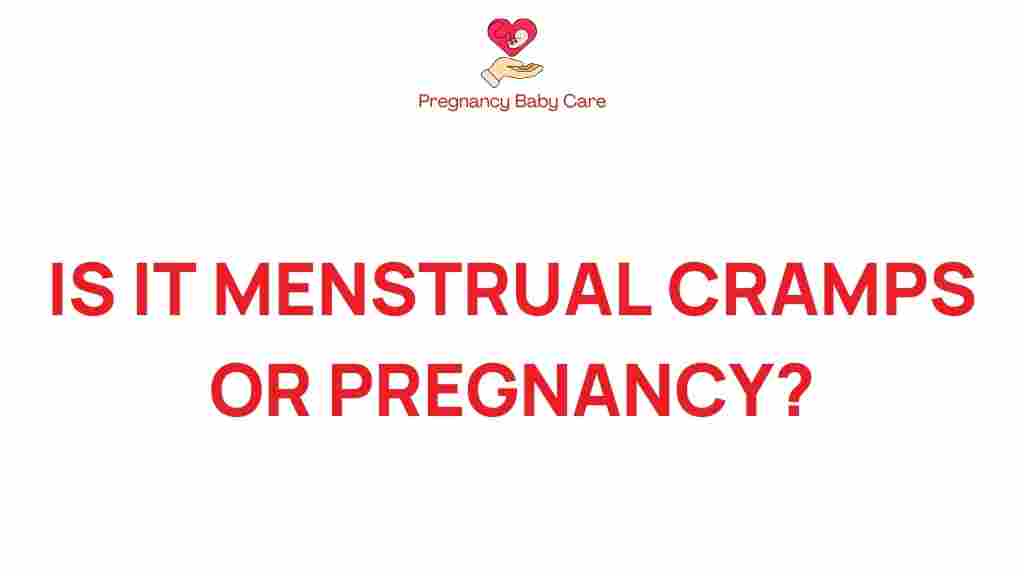Menstrual Cramps or Early Pregnancy? Unraveling the Mystery
Understanding whether you are experiencing menstrual cramps or the early signs of pregnancy can be a challenging puzzle for many women. Both conditions can cause similar discomfort and symptoms, making it difficult to differentiate between them. In this comprehensive guide, we will explore the nuances of menstrual cramps and pregnancy symptoms, helping you to identify your situation accurately. We will also delve into diagnosis, fertility, and overall reproductive health, ensuring that you have the information you need to make informed decisions about your health.
Understanding Menstrual Cramps
Menstrual cramps, medically known as dysmenorrhea, are a common experience for many women during their menstrual cycle. These cramps are caused by the contractions of the uterus as it sheds its lining. The severity and duration of menstrual cramps can vary significantly from one woman to another.
- Symptoms: The primary symptoms of menstrual cramps include throbbing or cramping pains in the lower abdomen, which may be accompanied by headaches, nausea, and fatigue.
- Timing: Menstrual cramps typically begin the day before or on the first day of menstruation and can last for a few days.
- Causes: The cramps are usually due to increased levels of prostaglandins, which are hormones that promote uterine contractions.
Identifying Early Signs of Pregnancy
Early pregnancy symptoms can sometimes mimic menstrual cramps, leading to confusion. Understanding these symptoms can play an essential role in determining whether you are pregnant.
- Common Symptoms: Early signs of pregnancy include missed periods, nausea (often referred to as morning sickness), breast tenderness, fatigue, and mood swings.
- Timing: Symptoms of pregnancy typically appear a week or two after conception, which may coincide with the time you expect your period.
- Hormonal Changes: Pregnancy triggers a surge in hormones such as human chorionic gonadotropin (hCG), which can lead to various physical and emotional symptoms.
Distinguishing Between Menstrual Cramps and Pregnancy Symptoms
To help you unravel the mystery of whether your discomfort is due to menstrual cramps or early pregnancy symptoms, consider the following aspects:
- Timing of Symptoms: If your symptoms align with your menstrual cycle, they are likely menstrual cramps. If you have missed your period and are experiencing other symptoms, it could indicate pregnancy.
- Nature of Discomfort: Menstrual cramps often feel like a dull ache or a sharp pain in the lower abdomen, while pregnancy symptoms may include a broader range of discomforts, such as nausea and fatigue.
- Home Pregnancy Test: Taking a home pregnancy test can provide clarity. These tests measure the level of hCG in your urine and can detect pregnancy as early as the first week after a missed period.
Step-by-Step Process to Identify Your Symptoms
Here’s a simple process to help you determine whether you are experiencing menstrual cramps or early pregnancy symptoms:
- Track Your Cycle: Keep a record of your menstrual cycle to understand your patterns better. Note the start and end dates of your periods, as well as any symptoms you experience.
- Assess Your Symptoms: Take note of the specific symptoms you are experiencing. Are they consistent with your menstrual history, or do they align with early pregnancy signs?
- Take a Pregnancy Test: If you suspect pregnancy, take a home pregnancy test for confirmation. Be sure to follow the instructions carefully for the most accurate results.
- Consult a Healthcare Provider: If you are still unsure or if your symptoms are severe, consult a healthcare provider for professional advice.
Troubleshooting Common Symptoms
If you find yourself experiencing discomfort, whether due to menstrual cramps or early pregnancy symptoms, here are some tips to alleviate your discomfort:
For Menstrual Cramps:
- Heat Therapy: Applying a heating pad or hot water bottle to your abdomen can relax the muscles and reduce pain.
- Over-the-Counter Pain Relief: Nonsteroidal anti-inflammatory drugs (NSAIDs) like ibuprofen can help relieve menstrual pain.
- Exercise: Engaging in light exercise, such as walking or stretching, can improve blood circulation and reduce cramps.
For Early Pregnancy Symptoms:
- Stay Hydrated: Drink plenty of fluids to combat nausea and fatigue.
- Small, Frequent Meals: Eating smaller meals throughout the day can help manage nausea.
- Rest: Ensure you get enough rest and sleep to support your body’s changes during early pregnancy.
When to Seek Medical Advice
While menstrual cramps and early pregnancy symptoms are typically manageable, there are times when medical advice is necessary. Seek help if you experience:
- Severe Pain: Intense pain that disrupts your daily activities may indicate a more serious condition.
- Heavy Bleeding: If you have heavy bleeding during your menstrual cycle or suspect a miscarriage, consult a healthcare provider immediately.
- Persistent Symptoms: If symptoms persist and are causing significant discomfort, it’s important to seek a medical evaluation.
Conclusion
Determining whether you are experiencing menstrual cramps or early pregnancy symptoms can be a complex task. By understanding the differences and similarities between these conditions, you can better navigate your reproductive health. Remember to keep track of your symptoms, consider taking a pregnancy test, and consult a healthcare professional when necessary. Maintaining awareness of your body is crucial for your overall health and well-being.
For more information on women’s health issues, including tips on reproductive health and fertility, check out this resource.
In summary, whether you are dealing with the discomfort of menstrual cramps or the early signs of pregnancy, knowledge is power. Stay informed, listen to your body, and don’t hesitate to reach out for help when needed.
This article is in the category Health and created by PregnancyBabyCare Team
